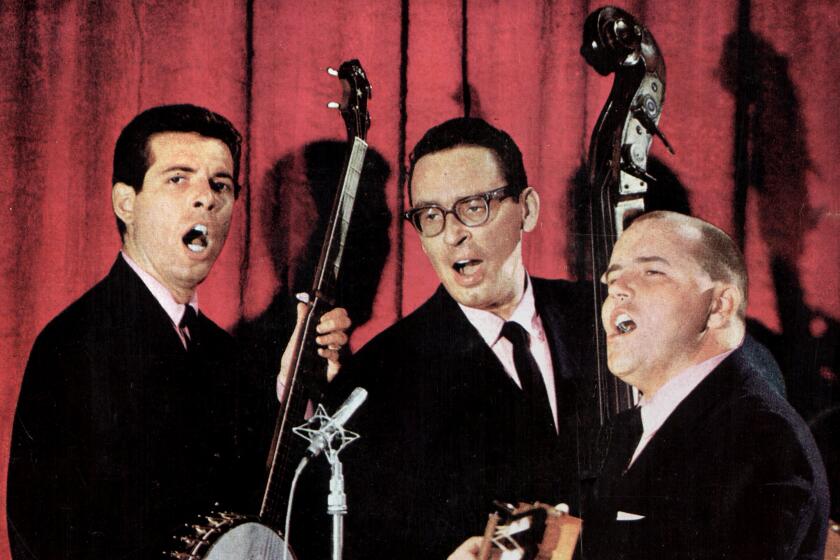Miscast
I didn’t want to review “Command Performance.” I turned it down. Twice. For me to review Jane Alexander’s book about her tenure as head of the National Endowment for the Arts would be like a food critic reviewing a restaurant whose food he once got sick on.
And then there’s the court battle: The National Endowment for the Arts and Jane Alexander vs. Karen Finley et al. The case that let the U.S. Supreme Court decide whether Congress had the right to impose content restrictions on a federal agency. She won, and I lost.
I have also had words with Alexander on the phone--within days of the start of her tenure. She called me because she had heard me criticizing her on public radio for asking Wendy Wasserstein to remove a line from her play “Sister Rosensweig” that she starred in. The line referred to Danny Kaye and Laurence Olivier as being lovers, and it apparently offended Olivier’s widow and adult child. The line was removed.
That is a form of censorship. Alexander disagreed; she said she was within her rights. She explained an actor is in collaboration with the playwright. I was not convinced. Some people will always be offended by what other people say; that is the reason for the 1st Amendment, which protects speech that not everyone agrees with or wants to hear.
Surprisingly, Alexander’s book “Command Performance,” the story of her four years as the head of the NEA, is an important read. Although she writes rather passionlessly, her sense of duty--to be a good civil servant and to do her best--comes across quite clearly.
In 1993, she was asked by President Clinton to put her acting career on hold to head the NEA, an agency that was a prime battleground during the height of the culture wars. It was a role that cast her as a Florence Nightingale of sorts, a pioneer woman in a storm of mean, insincere and petty politicians trying to save a babe in her arms, trying to suckle a crying baby with a dried breast. Her baby, the NEA, needed to be fed, and the hungrier the baby got, the more the child cried, and the mean people around her who hate the crying didn’t have babies of their own. I have every reason to believe that had she been able to feed the baby, the NEA as adult would have flourished.
What we really needed, however, was not a Nightingale but a hawk: a Schwarzkopf, a Churchill, a Dr. Koop with enough military bravado to fight for the agency without being cordial, knowing the lines or taking a final bow. The Clinton administration purposely selected a liberal with a good conscience, manners and breeding. Unfortunately, an actress wasn’t who was needed to win the culture war.
Yet to be fair, because Alexander was never given a chance to do her job, she could never truly give the performance she was capable of giving as head of the NEA. The unreasonable pressures, demands, defending and fighting would have crushed any other person much earlier in the game. Alexander has a strong propensity for not letting her emotions get the best of her, but perhaps a little emotion is what was called for, a passion for her beliefs rather than the need to be reasonable around a bunch of zealots who were using the arts as a scapegoat for a political platform.
*
If circumstances had been different, had she been tenured during friendlier times, Alexander would have been a tremendous leader and champion for the arts. She would have seen to it that every child received an education in culture and that every citizen had access to art, music, theater and literature in a variety of forms and programs. She has quite a fine mind--spirited and sincere--and she has overall goodness. She would have seen to it that culture prevailed everywhere and was available to all. This missed opportunity of squandered talent is a disappointment.
From the minute Alexander found herself in the company of Jesse Helms, Newt Gingrich and David Gergen et al., she had to perform her lines, mount her defense, wage her battles. And she is--unfortunately for the story and fortunately for her own life--not screwed up or neurotically oriented. She doesn’t suffer from a savior complex and seems to have remained composed. She’s pleasant through it all. Her desires are plain and simple; she simply wanted to serve her country and see to it that art is enjoyed, encouraged and discussed.
The book is divided into theatrical headings: “The Audition,” “The Rehearsal,” “The Players Backstage” and “Curtain Down.” We see her in the beginning of the story being investigated by the FBI prior to her appointment. Her friends, family and colleagues are questioned on her credibility.
At the same time, and independent of the FBI investigation, she discovers to her horror that her financial manager had been ripping her and her husband off for the last five years, leaving them with practically nothing. This detail is important: It shows that she is somewhat gullible, thinks the best of people and is not particularly street-smart.
As it turns out, this kindness and belief in human good are Alexander’s undoing. The political world she enters is a world rife with sharks, and as “Command Performance” shows, she has too much poise, intelligence, charm and breeding to triumph in such a world.
Alexander’s husband, Ed Sherin, who was the director of “Law and Order” during her reign, perhaps should have put their talents and wits together to create instead a TV drama called “Museum.” Alexander could have played the museum director, a kind of Agnes Gund of a Museum of Modern Art, a Whitney, a Guggenheim. The show could have been a “Dynasty”-like serial with a catchy opening song. There would be the wild and crazy artists and their political and controversial art. There would be the patrons, the old and new money, the board, the openings parties, the corporate sponsors and, of course, the politicians. In this setting, Alexander could have served us and herself better by being true to her talents.
It is clear she suffered emotionally and physically throughout her ordeal at the NEA. Her back was crippled in pain and, tragically, her stepson died of a heart attack while skiing at the age of 33. We also see her championing the rights of artists who were as controversial as gay performance artist Ron Athey, a colleague and friend of mine who does extreme work with titles such as “solar anus.”
But just once, I wished Alexander, who remained cordial to Helms, had mustered up the courage that artists bring to their work each day and shouted, “[Expletive] off, Helms! Screw you, Newt!”
But she avoided confrontation, and that is why she would have done a better job had she remained an actress. Onstage, she might have performed the firebrand that we needed at the NEA. Instead, her performance in Washington never matched the other actors’. She was, alas, upstaged.
More to Read
The biggest entertainment stories
Get our big stories about Hollywood, film, television, music, arts, culture and more right in your inbox as soon as they publish.
You may occasionally receive promotional content from the Los Angeles Times.






